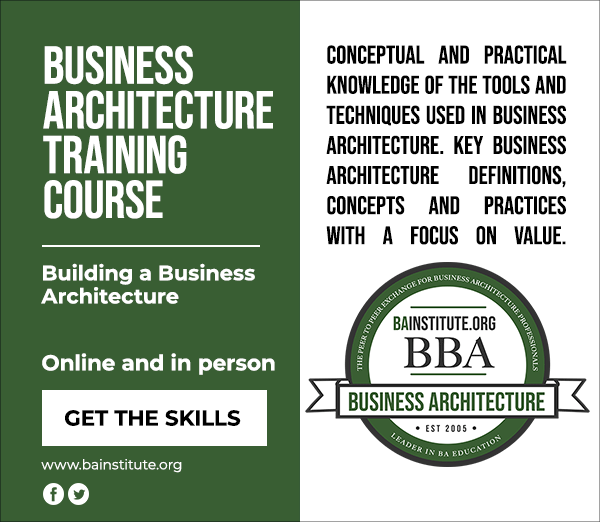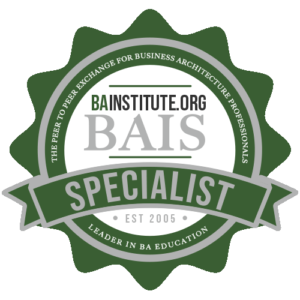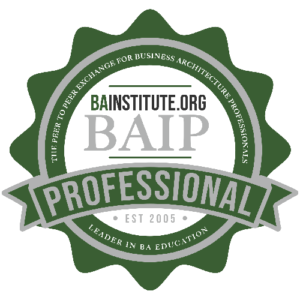Building a Business Architecture: Part 1 – Face-to-Face
$1,195.00
Business Architecture provides context and understanding for defining and delivering organizational strategy. This course builds both conceptual and practical knowledge of the tools and techniques used in business architecture.
| Course Date | Standard Rate | Buy Before | Your Rate | Savings |
|---|---|---|---|---|
| Jun 10 '25 | $1,195.00 | May 11 | $1,095.00 | -$100.00 |
| Sep 16 '25 | $1,195.00 | Jul 18 | $895.00 | -$300.00 |
| Nov 18 '25 | $1,195.00 | Sep 19 | $895.00 | -$300.00 |
Business Architecture provides context and understanding for defining and delivering organizational strategy. This course builds both conceptual and practical knowledge of the tools and techniques used in business architecture.
This course provides an overview of key Business Architecture definitions, concepts and practices with a focus on value delivery using key business architecture techniques. To achieve business alignment, we must first:
- Understand the factors that motivate the business
- Extract and drive additional detail into elements of the business capabilities
- Clearly articulate the Ends – purpose that the business intends to achieve
- Clearly articulate the Means – things that the business will employ to achieve those Ends
The business model enables this alignment and quickly becomes the foundation for connecting solutions, indeed the entire operating model, to the business intent. Using a case study, we will learn a quick and popular method for creating a business model and simultaneously, how to facilitate others through the process.
We will also begin to discover, define, and develop the capability map for an organization through the application of a case study. The Strategy Map will be formed in the context of business capability assessment, measurement, and performance. Future state business modeling will be performed using a case study and the skills and tools class participants have mastered.
This course is helpful for anyone seeking a better understanding of the role of business architect and business architecture, those leaders tasked with bringing the practice into their organizations and using it to achieve real business results. It’s also for executives who are transforming their business to meet customer demands and compete in a fast-paced environment.
Please note that this is a 2-Day course and counts as two courses towards your Business Architecture Certificate.
Outline:
- Define business models and practice business modeling
- Demonstrate strategy to execution alignment using business modeling
- Deliver immediate planning and leadership value with Business Architecture
- Understand the linkage between business purpose and capabilities
- Understand the factors that motivate the business
- Create roadmaps to support delivery of the results the business intends to achieve
- Use business models and business modeling to set strategy
- Apply strategy to execution alignment using business modeling and capabilities as foundation
- Demonstrate immediate planning and leading value with Business Architecture
- Understand how capability maps are used to enlighten leaders and managers
- Assess health and viability of business capabilities
- Extract and drive additional detail into elements of the strategic plan
- Gain an understanding of fundamental aspects of business architecture and how it can help address critical business challenges
- Learn how to build capability maps, value maps, organization maps and information maps
- Understand how to extend the business architecture into areas such as strategy mapping, product mapping, stakeholder mapping and initiative mapping
- Learn industry accepted approaches for establishing and governing business architecture including how to setup and manage a team
- Walk through various scenarios, case studies and exercises for deploying business architecture
- Deliver a set of “getting started” guidelines for business architecture
This course is based on practical, field-tested work at numerous businesses, including commercial and government sectors. It applies a standard approach that is outlined in the Business Architecture Guild, Business Architecture Body of Knowledge (BIZBOK™).
- Business architects
- Business analysts
- Business managers and executives
- Enterprise architects
- Program and portfolio managers
- Business strategists
- IT architects and executives who need to engage with business architecture
- Other specialists requiring a working knowledge of business architecture


















